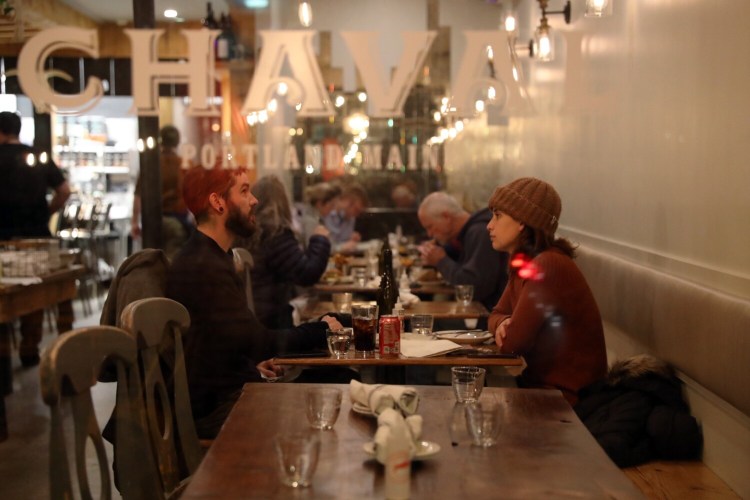Summer spending at Maine hotels and restaurants surged to a record high in 2021 as the state’s service industry continued recovering from losses incurred in the early months of the coronavirus pandemic.
Maine lodging and restaurant sales reached nearly $2.5 billion between June and September, according to Maine Revenue Services. This summer’s spending was almost $1 billion more than during the same period in 2020 and a 14 percent increase from the roughly $2.2 billion record set in 2019.

Overall, people spent more than $3.7 billion on Maine restaurants and lodging in the first nine months of the year, almost 10 percent more than the same period of 2019 and putting the state on track for a record-busting year.
An influx of tourists to Maine last summer fed the spending boom. But greater prices resulting from a tight labor market and higher energy and material costs likely pushed spending up too.
“Certainly the increase in tourism to Maine is part of this growth,” said Kelsey Goldsmith, communications director for Maine Revenue Services. “Inflation also likely contributes somewhat. Economists nationwide believe that both increased volume and rising costs are at play throughout the country. There is not yet reliable data that allows economists to tease out the mix between the two.”
Summer visitors flooded back into Maine this year after the state dropped virtually all public health and travel restrictions that kept many away in 2020. About 10 million people traveled to Maine over the summer, just surpassing the record set in 2019, according to research conducted for the Maine Office of Tourism.
Considering tourism’s strong rebound, Matt Lewis, CEO of the HospitalityMaine trade group, thinks it was more spending, not higher prices, driving up sales.
“I think it was absolutely demand in Maine,” Lewis said. “What we are hearing from many of our members in many parts of the state is that they are experiencing much higher business than usual into the fall.”

Cooks work in the kitchen at Chaval restaurant in Portland on Tuesday. Maine lodging and restaurant sales reached nearly $2.5 billion between June and September, according to Maine Revenue Services. Ben McCanna/Staff Photographer
Still, a challenging local labor market and restrictions on international workers left many unfilled shifts. Even if those challenges limited hospitality earnings, last summer was still a positive step for an industry still recovering from the gut punch it took in 2020 despite federal and state bailouts.
“Hotels and restaurants, like other businesses, are playing catch-up on the last 18 months – fortunately they had a busy summer and fall,” Lewis said.
For some business owners, the record-breaking spending obscures what has been a tough and exhausting period.
“Our lodging was up quite a bit, but our restaurant was down significantly because we didn’t have enough people to open all shifts,” said Gary Dominguez, owner of the York Harbor Inn, a 67-room hotel with two restaurants in York.
The hotel had to discontinue two weekly nights of service in the main dining room, three nights in its pub and even stopped serving Sunday brunch for the first time in 40 years. Higher lodging sales helped balance the books, but the hotel missed out on revenue when it had to close some rooms because it didn’t have enough housekeepers, Dominguez said.
“It was busy, but we didn’t have the infrastructure,” said Dominguez, who relies on foreign students to staff up each year, but such workers were unavailable in 2021.
“It is definitely not ideal by any means,” he said. “It is not a good situation and seems even bleaker looking forward.”
For Ilma Lopez and Damian Sansonetti, frequent rainy days in the height of tourism season dampened sales at their Portland restaurant, Chaval. The restaurant relied on outdoor seating during the summer and only opened for indoor dining a little more than a month ago.
“The summer was wetter and there was a little worse weather than the year prior – that just added on top of everything else,” Sansonetti said.
So far, the restaurant is holding its own and keeping options open for patrons who prefer to eat indoors or al fresco – even as nightly temperatures dip below freezing. It’s enough to keep pace with rising business costs, Sansonetti said.
“Labor went up across the board for everything, our (product costs) went up, insurance, taxes – there wasn’t anything this past year that the arrow went down on,” he said. “Everything trended upwards.”

Bartender Asher Boisvert pours a cocktail at Chaval restaurant in Portland on Tuesday. Ben McCanna/Staff Photographer
If the experience this year is any indication, tourism spending is likely to continue rising into next year.
TREND LIKELY TO CONTINUE
Tiffany Ford, owner of On The Water in Maine, said some of the vacation rental homes her agency manages are already fully booked for next year. Her business, which rents mainly in the Midcoast region, has been incredibly busy for more than a year.
“This summer we we were absolutely slammed – it was my biggest year in the 16 I have been in business,” Ford said. “There were no vacancies from beginning of June through October.”
Prices for vacation rentals went up this year in an effort to recoup some losses owners suffered in 2020. But whatever the price, people were willing to pay it, Ford said. “Heavy-hitters” from New York, New Jersey and other parts of New England were comfortable plunking down whatever it cost to rent homes for three to four weeks, not the usual weeklong vacations.
“People weren’t negotiating at all,” she said. “They were spending the amount of money it was and staying longer and spending more money as a result.”
Send questions/comments to the editors.



